First of the Month | November 2021
“Entering the Old City is a wonderful induction into Palestinian food and markets. Women from the surrounding villages sell fresh produce on the steps, the aroma of cardamom-infused coffee from street vendors hangs in the air.” Gemma Bell and Heather Masoud take us on a journey to the markets, restaurants and kitchens of Palestine. Photography by Issy Croker.

In 2016 Amos Trust and Zaytoun introduced the Taste of Palestine tour visiting farmers, restaurants, kitchens and markets as a delicious way to taste, connect and learn more from a rich culture.
Together we have run these trips during the olive harvest season. We hope we will be back in 2022 but for now, we’d like to share some stories and reflections from previous visits.
This time of year is one of joy in Palestine as extended families gather and pick by hand, the olives from their trees that characterise the hills of the West Bank. Ancient stone terraces outline the contours, people with ladders and generous picnics dress the landscape. It is also a time of fear that settlers will continue, with impunity, to attack Palestinian property and people.
This combination of joy and distress is what drove us to set up Zaytoun 17 years ago; to encourage people to join the harvest each year. A bottle of Palestinian olive oil is a potent symbol of livelihoods, connection and stewardship with the land, resistance to being uprooted and of wonderful culture and food.
Musakshan
Musakhan is a celebration of the new olive oil season; roasted sumac chicken, caramelised onions, pine nuts and fresh taboon bread come together gloriously with the generous helping of olive oil fresh from the press. Best enjoyed al fresco.
(There’s a wonderful vegetarian option of this dish in Falastin, Sami Tamimi and Tara Wigley’s Palestinian cookbook that was published in 2020.)
We have feasted on Musakhan with groups from the UK as part of the Jaru’a olive harvest festival hosted by Canaan Palestine at their site in Burqin — an event where hundreds of olive farmers and their families gather with international visitors, to dance dabke, eat together and mark the close of the harvest.
Canaan and the Palestine Fair Trade Association were founded by Nasser Abufarha, an entrepreneur who returned to Palestine with a mission to support small-scale farmers through ethical trade. Both Canaan and PFTA now work with over 2000 artisan families with an ethos on transparency, long-term relations with fair prices and ecological sustainability.
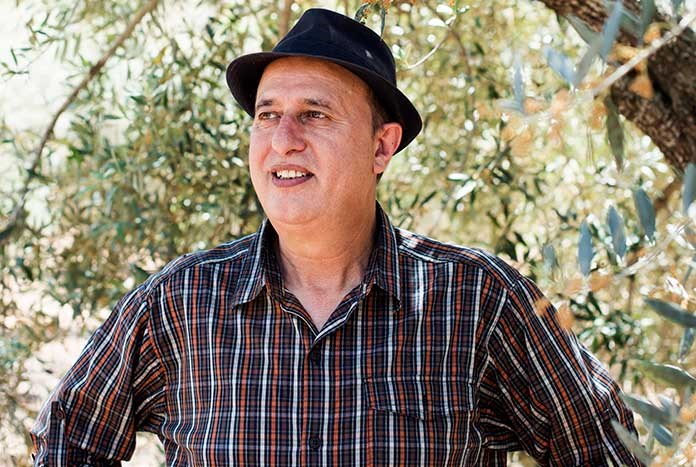
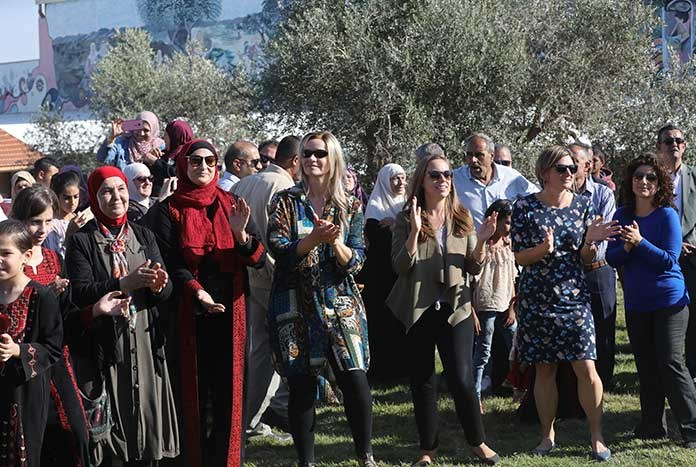
Top: Palestinian entrepreneur, Nasser Abufarha. Bottom: The Jaru’a Olive Harvest Festival hosted by Canaan Palestine at their site in Burqin.
Freshly pressed, unfiltered olive oil will be bottled for Zaytoun at Canaan’s factory in November and should arrive into the UK in December. As testimony to the artisanship of the farmers, it has just been awarded a Great Taste Award. In the absence of visiting and enjoying the oil straight from the press this ‘fresh juice’ is as close as we can get to a taste of Palestine.
Kunafa
Heading towards Nablus, a Kunafa stop in the vibrant Khan Al-Tujjar market is obligatory. Kunafa is a traditional Middle Eastern dessert made with spun pastry called Kataifi, which is soaked in a sweet, sugar-based syrup and typically layered with cheese. On harvest tours we often follow our Kunafa stop with an overnight stay in the hilltop village of Sebastiya.
Supping fresh lemonade or a cold Taybeh beer in Sebastiya's plaza next to the Roman amphitheatre, as the setting sun bathes the olive trees in golden light is an experience we invite you to enjoy. We also extend the invitation to sit with residents of, what should be, this idyllic village and hear of the frequent incursions of the Israeli army and the settlers.
Supping fresh lemonade or a cold Taybeh beer in the Sebastiya's plaza next to the Roman amphitheatre, as the setting sun bathes the olive trees in golden light is an experience we invite you enjoy.
Some of Israel’s most ideological settlements are located in the hills around Nablus. We receive regular photos of groups of heavily armed settlers from the Yitzhar settlement entering the olive groves around Burin and chasing out farmers and their families who are harvesting. Olive harvest is a time of coordination between community organisers with international and Israeli accompaniers who also pick olives and bear witness to the issues.
Esther, one of the volunteers, spoke about the harvest in Kufr Qadum.
“We accompanied one family from As Sawiya, bordering the settlement of Rehalim, for three days, working flat out. Settlement security was irked by our presence and on one day they called the IDF to force a large Palestinian family from olive groves where in fact no permit was required.
Working alongside our hosts on the harvest allowed us to witness the oppression first-hand and use this to subsequently testify to others the meaning of the occupation. Conversely, the landscape, ancient olive groves, family meals under the trees, the talk, storytelling, songs, time off school and work made the harvest a Palestinian celebration of life, history and continued presence, shared with us and even with their families in the diaspora by ‘visits’ on mobile phones.”
Settlement security was irked by our presence and on one day they called the IDF to force a large Palestinian family from olive groves where in fact no permit was required. Esther
Geo-diversity
One of the joys of travelling in the West Bank is the geo-diversity. Heading from Nablus down to Jericho can mean an increase in temperature of 10 degrees and a shift from tree-filled hills to desert palms. This year's date harvest came to a close towards the end of September and the new harvest of Medjouls will soon be arriving in the UK.
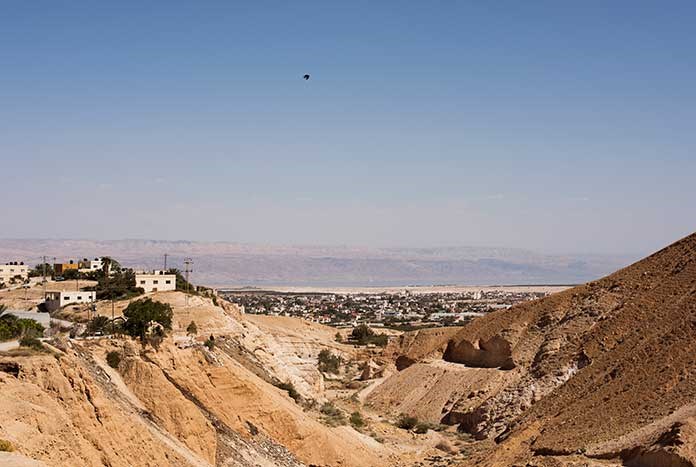
Heading from Nablus down to Jericho can mean an increase in temperature of 10 degrees.
Illegal settlement agriculture and Palestinian production are growing quite literally side by side; a primary difference being the access to water. The date sector provides jobs in an area where unemployment is high and offers the opportunity for local workers to return home at the end of a working day.
Our friend Taysir Arbasi visited with date farmer Abu Talal during the harvest in September to catch up on news from this year’s harvest. Abu said that being able to finish work and return home to spend time with his family meant local employment was key to him compared to the lengthy journeys endured by those who cross the checkpoints. He has been harvesting his dates with the help of his grandchildren this year.
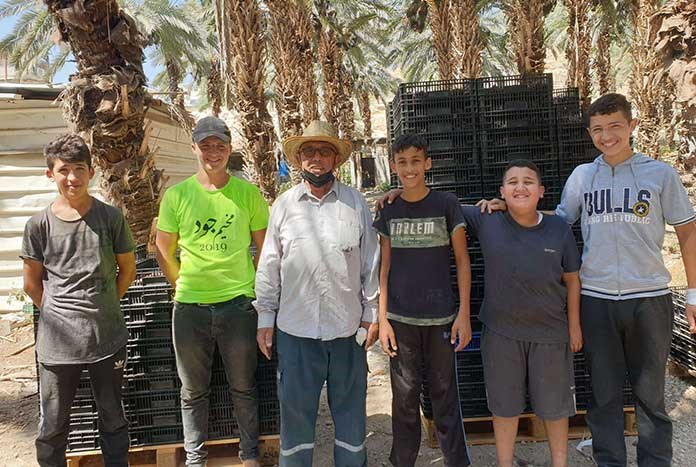
Date farmer Abu Talal and his grandsons during the date harvest.
Taysir has been part of Zaytoun from the beginning; supporting visits to Palestine and accompanying Palestinian farmers to the UK each year during Fairtrade Fortnight. These face-to-face visits are at the core of building connections and challenging injustice together. He has coordinated aspects of the Amos/Zaytoun Taste of Palestine tours each year.
He said, “The tours held in the previous years have raised awareness. They have been a practical experience and a direct engagement with the cause of the farming community in Palestine.
For many participants, it has shifted their views and personal opinion; the tours have demonstrated to everyone the injustice that the Palestinian farmers are living with and the relevance of the work to support the producers through Fair trade. They have also given space to people who wanted to explore the Palestinian wealth of traditions and food culture.”
Dead Sea
The Dead Sea is yet another unique and sought-after gem in this land. The West Bank Salt Company is the only Palestinian business that has, with decades of focus, maintained rights to this mineral rich resource. Uthman Hallak, now in his late 80s, started salt production at their site in 1964 and his son, Husam, now runs the company.
Their fortitude allows high quality Palestinian salt to reach domestic and international markets. Beyond the employment of their 25 staff, they provide financial support for their employees' children to attend college. Zaytoun aims to be offering their bath and culinary salt to you in 2022."
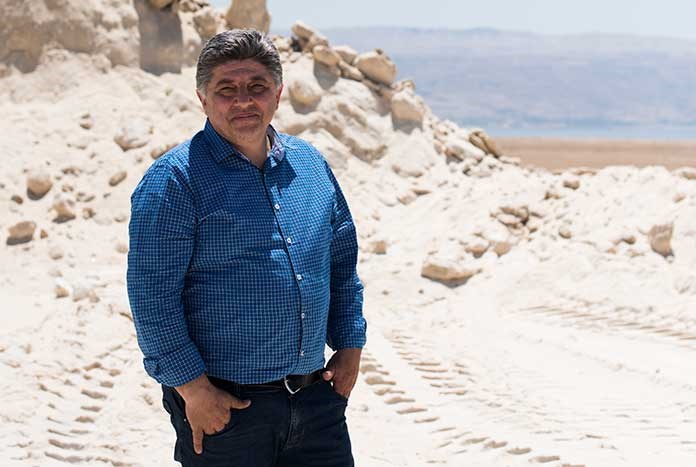
Husam Hallak from the Dead Sea Salt Company.
Bethlehem
Gemma Bell, an Amos trustee and great friend of Zaytoun, was on the first Taste of Palestine tour. In 2019, she took a group of journalists, chefs and photographers to Palestine which resulted in Palestinian food-inspired stories reaching a new audience here in the UK. She shares some memories.
Bethlehem is a tour highlight. Just saying ‘Bethlehem’ conjures up nostalgic thoughts of the ‘Little Town’ from children’s nativity plays. This town, despite its 8-metre high ‘security’ wall and its occupants living under occupation, is vibrant and full of life.
On entering, young IDF soldiers check documents and big red signs warn visitors not to enter. Check Point 300 (where Bethlehemites leave and enter the town), is oppressive and tells of the daily difficulties men, women and children face just to visit family, go to work, or go to school.
Fadi Kattan owns the beautiful guest house ‘Hosh Al Syrian’, which is just off Star Street and which we hope will re-open soon along with his acclaimed restaurant Fawda. Fadi is Franco-Palestinian and knows just about everyone in town! (Check out his amazing Qalayet Bandora recipe below!)
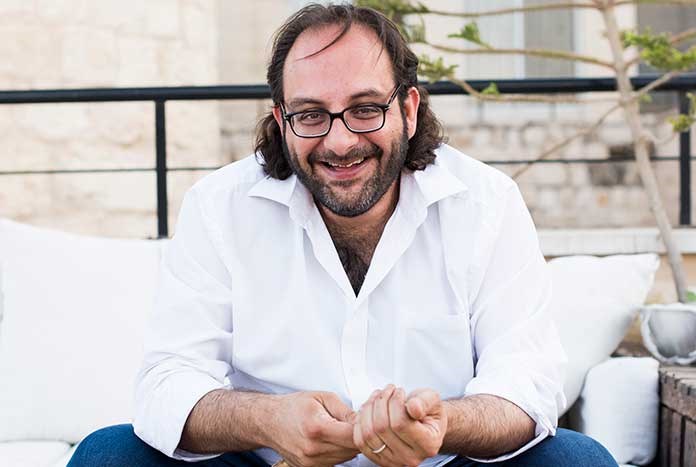
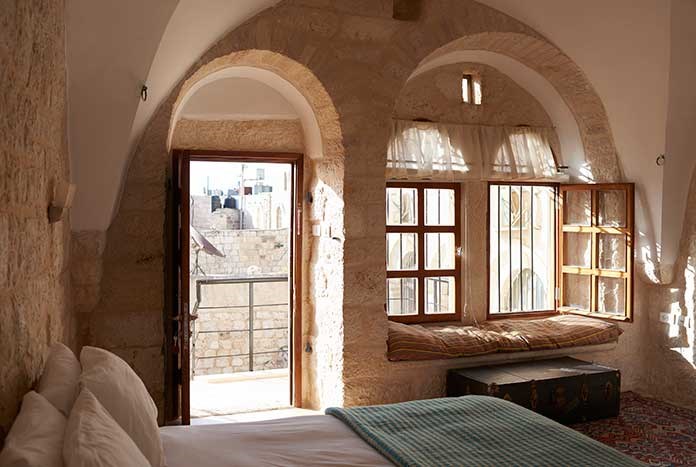
Top: Franco-Palestinian chef and guest house owner, Fadi Kattan. Bottom: One the bedrooms at the Hosh al-Syrian guest house in Bethlehem.
On his ‘tour’ of his favourite places, we start at the fruit and veg market and meet Um Nabil at the entrance who sells the freshest most seasonal herbs and greens. On a visit in June we stumble across small green berries and realise they are fresh chickpeas. Market stalls with boxes of fresh produce are piled high as we wander through the meat section and greet the butchers, who are, of course, selling lots of lamb.
This town, despite its 8-metre high ‘security’ wall, and its occupants living under occupation, is vibrant and full of life.
Continuing through the winding streets, we enter a pickle and spice haven — Samer Daoubi, where we try halva and balls of labneh coated in varying dried herbs and spices. We are wowed at Shweki Bakery by the skills of the young bakers and stop at the spice shop for strong, cardamom-infused coffee before buying as many packets of nuts, herbs and spices as our suitcases will carry.
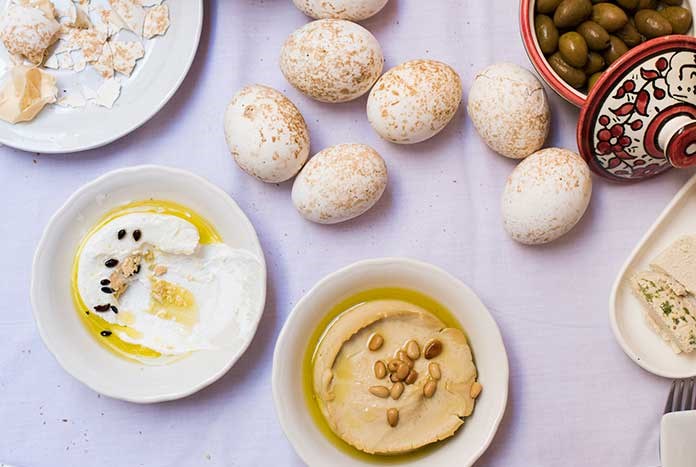
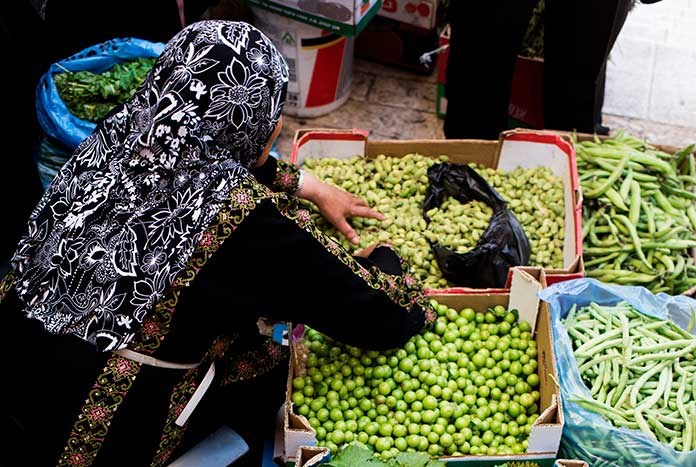
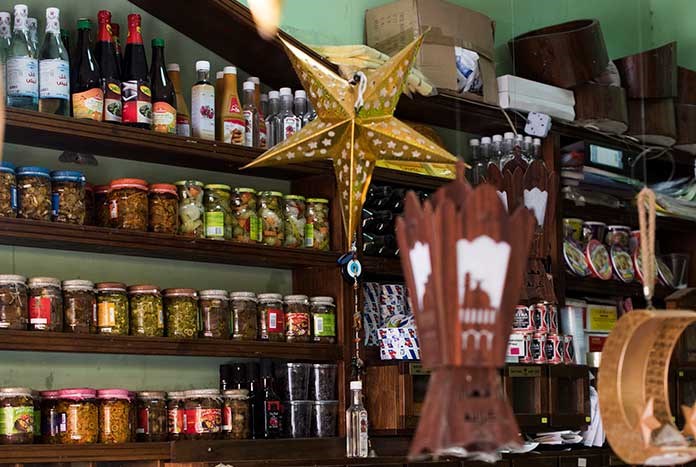
Top: A traditional Palestinian breakfast from Afteem’s Restaurant. Middle: A Palestinian women selling fresh chickpeas at a Bethlehem market. Bottom: Samer Daoubi’s pickle and dairy shop in Bethlehem.
For me, you cannot go to Bethlehem without a visit to Afteem’s Restaurant just off Manger Square. This institution makes the very best falafel, foul and hummus, Arabic salad and more. Food is the soul of Palestine. Sharing and eating dishes that haven’t changed in centuries brings a connection to the history of the people living under an unjust occupation; some of these same dishes have been appropriated by the occupiers and claimed as their own.
Jerusalem
The journey from Bethlehem to Jerusalem can be a twenty-minute drive on settler roads, or it can take hours passing through checkpoints. For some Palestinians, it’s a destination they have never reached because they have the wrong I.D. card.
Entering the Old City via the Damascus Gate is a wonderful induction into Palestinian food and markets. Women from the surrounding villages sell fresh produce on the steps, the aroma of cardamom-infused coffee from street vendors hangs in the air, carts of Ka’ak Al Quds (a type of Jerusalem bagel) are being sold on every corner and calls from the fruit and vegetable stalls all come before we reach the spice shops and bakery windows full of Baklawa, the beautiful layered pastry dessert.
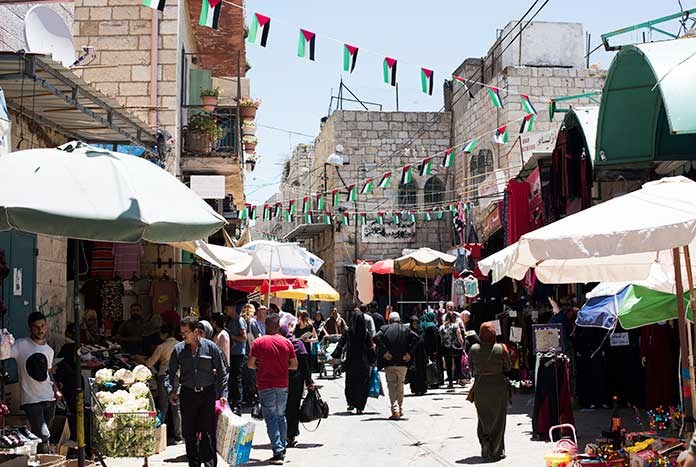
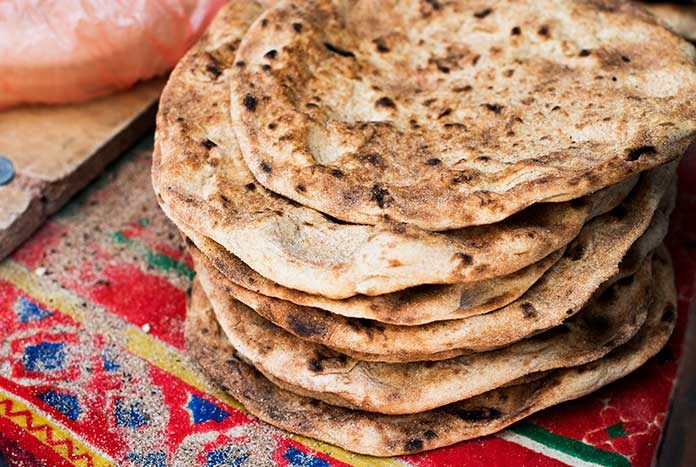
Top: A market in Jerusalem’s Old City. Bottom: Shweki Bakery in Bethlehem.
Glance upwards and Israeli flags, armed soldiers and civilians on raised walkways are a reminder that occupation is never far away. Illegal settlement expansion continues apace and this combination of joy and fear is, again, part of what makes the impression of Jerusalem such an indelible one.
“The Taste of Palestine tour was very well planned to give us a balance between the awful difficulties the Palestinians face and the wonderful history and culture of their land. Picking olives and the visit to Bassema’s house were real highlights, as was the visit to the Sebastiya olive press and eating at night on the terrace. For me it was just an amazing week.” Gillian, 2017 tour participant.
A final thought from Heather and Gemma
Uprooting...
Many other destinations which have been part of these tours, where tales and tastes abound, include Nazareth, Battir, the Galilee and Hebron but we'd like to close with thoughts of one woman during this harvest season — Khitam Ya’quob.
In early 2021, the Israeli military uprooted 3400 olive trees in her village, Deir Ballout. 750 of these trees belonged to Khitam which meant that her source of income was decimated. She, like many farmers, talked of caring for the trees as if they were family members. The trees are known and nurtured.
“This season we don’t have our own olive grove to harvest. Earlier this year we replanted olive trees from the ‘Trees for Life’ programme. We worked most of the summer time in the land and irrigated the young trees that are still not productive. We joined the harvest with the wider family — the brothers of my husband's family, so we can get some olive oil for our own consumption.”
We wish all Palestinian farmers safety to bring home their harvest this year and our best wishes as they celebrate the season.
Gemma Bell and Heather Masoud
Qalayet Bandora
Fadi Kattan’s recipe
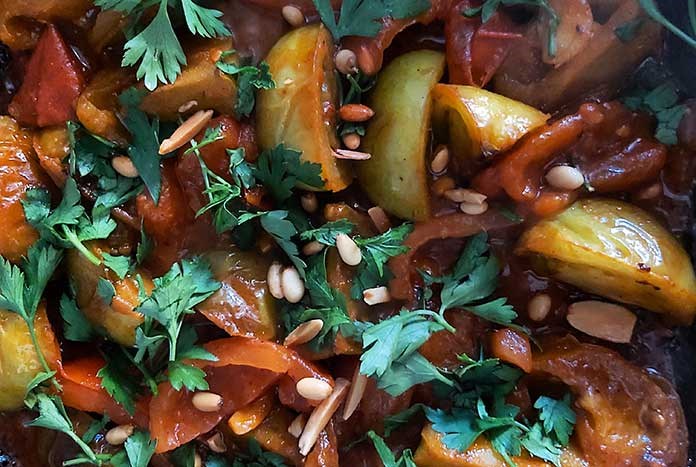
One of the tricky and yet diverse Palestinian dishes. Diverse by its recipes, as numerous as there are households in Palestine but also diverse in its pronunciation.
From the Galayet Bandora to the Qalayet Bandora to the Alayet Bandora, the sound travels from the shores of Gaza to the hilltops of olives and figs to the bustling cosmopolitan cities.
A perfect recipe for a snack, breakfast or as an accompaniment to a meat dish or part of a mezze. The green tomatoes bring an interesting acidity and texture while the red tomatoes round the dish with earthy depth.
Often, in traditional qalayet bandora, the skin is peeled off the tomatoes and yet I prefer leaving the tomatoes as is.
Serves 4
Ingredients
- 800 gr. small green tomatoes
- ½ kg. red ripe tomatoes
- 6 Garlic cloves
- 6 + 1 tbsp. olive oil
- 1 tbsp. Tomato paste
- 1 tbsp. Pine nuts
- 1 tbsp. Almonds (peeled and slivered)
- ½ cup Parsley leaves
- 2 tsp. Chili infused olive oil or even better chili and zaatar infused olive oil
Method
- Wash and pat dry well the tomatoes. Cut the green tomatoes in four and the red tomatoes into small wedges.
- Peel the garlic cloves and leave them whole.
- In a large pan, over medium high heat, heat the 6 tbsp. of oil the olive oil and gently fry the green tomatoes, tossing well so as to have an even cooking on all sides. Add the whole garlic cloves.
- Once the green tomatoes have turned a deep golden green colour, add the chopped red tomatoes and reduce the heat.
- After 5 minutes, add the tomato paste and the water, stir well and leave to cook until the sauce thickens, around 10 to 12 minutes.
- In the meantime, heat the remaining olive oil in a pan and toast the almonds and pine nuts. Be careful to remove them just before they reach the golden colour and with a spoon slot them out onto absorbent kitchen paper. Add the oil onto the still simmering tomatoes.
- Serve in the pan or in a shallow bowl, sprinkle some of the chili olive oil and then the pine nuts, almonds and parsley.
We’re planning our next Taste of Palestine trip with Zaytoun for October/November 2022. If you would like to join us, you can find full details of the trip here.
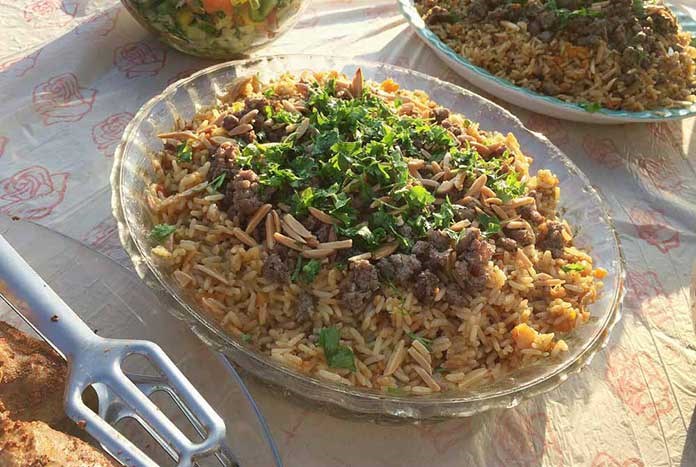
A lLittle more
Words Of Hope E-news
Sign up to receive our regular ‘Words Of Hope’ emails and keep up to date with all the latest Amos news and information, including details of our trips and events, news from our partners around the world and all of our campaigns.
Online reflection
Join us every Tuesday at 5pm for ‘Words Of Hope’ — our online reflection. Simply click here to join us a few minutes beforehand.





